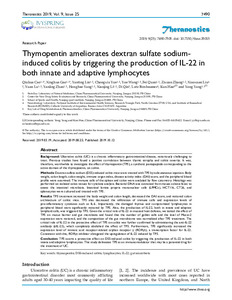Please use this identifier to cite or link to this item:
https://repositorio.uca.edu.ar/handle/123456789/9854| Título: | Thymopentin ameliorates dextran sulfate sodium-induced colitis by triggering the production of IL-22 in both innate and adaptive lymphocytes | Autor: | Cao, Qiuhua Gao, Xinghua Lin, Yanting Yue, Chongxiu Wang, Yue Quan, Fei Zhang, Zixuan Liu, Xiaoxuan Lu, Yuan Zhan, Yanling Yang, Hongbao Li, Xianjing Qin, Di Birnbaumer, Lutz Hao, Kun Yang, Yong |
Palabras clave: | COLITIS; TIMOPENTINA; TRATAMIENTO MEDICO; LINFOCITOS | Fecha de publicación: | 2019 | Editorial: | Ivyspring International Publisher | Cita: | Cao, Q. et al. Thymopentin ameliorates dextran sulfate sodium-induced colitis by triggering the production of IL-22 in both innate and adaptive lymphocytes [en línea]. Theranostics. 2019, 9(25). doi:10.7150/thno.35015 Disponible en: https://repositorio.uca.edu.ar/handle/123456789/9854 | Resumen: | Background: Ulcerative colitis (UC) is a chronic inflammatory gastrointestinal disease, notoriously challenging to treat. Previous studies have found a positive correlation between thymic atrophy and colitis severity. It was, therefore, worthwhile to investigate the effect of thymopentin (TP5), a synthetic pentapeptide corresponding to the active domain of the thymopoietin, on colitis. Methods: Dextran sulfate sodium (DSS)-induced colitis mice were treated with TP5 by subcutaneous injection. Body weight, colon length, colon weight, immune organ index, disease activity index (DAI) score, and the peripheral blood profile were examined. The immune cells of the spleen and colon were analyzed by flow cytometry. Histology was performed on isolated colon tissues for cytokine analysis. Bacterial DNA was extracted from mouse colonic feces to assess the intestinal microbiota. Intestinal lamina propria mononuclear cells (LPMCs), HCT116, CT26, and splenocytes were cultured and treated with TP5. Results: TP5 treatment increased the body weight and colon length, decreased the DAI score, and restored colon architecture of colitic mice. TP5 also decreased the infiltration of immune cells and expression levels of pro-inflammatory cytokines such as IL-6. Importantly, the damaged thymus and compromised lymphocytes in peripheral blood were significantly restored by TP5. Also, the production of IL-22, both in innate and adaptive lymphoid cells, was triggered by TP5. Given the critical role of IL-22 in mucosal host defense, we tested the effect of TP5 on mucus barrier and gut microbiota and found that the number of goblet cells and the level of Mucin-2 expression were restored, and the composition of the gut microbiome was normalized after TP5 treatment. The critical role of IL-22 in the protective effect of TP5 on colitis was further confirmed by administering the anti-IL-22 antibody (αIL-22), which completely abolished the effect of TP5. Furthermore, TP5 significantly increased the expression level of retinoic acid receptor-related orphan receptor γ (RORγt), a transcription factor for IL-22. Consistent with this, RORγt inhibitor abrogated the upregulation of IL-22 induced by TP5. Conclusion: TP5 exerts a protective effect on DSS-induced colitis by triggering the production of IL-22 in both innate and adaptive lymphocytes. This study delineates TP5 as an immunomodulator that may be a potential drug for the treatment of UC. | URI: | https://repositorio.uca.edu.ar/handle/123456789/9854 | ISSN: | 1838-7640 | Disciplina: | MEDICINA | DOI: | 10.7150/thno.35015 | Derechos: | Acceso abierto | Fuente: | Theranostics. 2019, 9(25) |
| Appears in Collections: | Artículos |
Files in This Item:
| File | Description | Size | Format | |
|---|---|---|---|---|
| thymopentin-ameliorates-dextran-sulfate.pdf | 3,22 MB | Adobe PDF |  View/Open |
Page view(s)
266
checked on Feb 9, 2026
Download(s)
187
checked on Feb 9, 2026
Google ScholarTM
Check
Altmetric
Altmetric
This item is licensed under a Creative Commons License

